Baking together naturally eases family stress by engaging multiple senses and fostering connection through shared activities. You'll find the process promotes mindfulness and focus, as precise measurements and structured tasks ground you in the present moment. Kneading dough releases physical tension, while creative decorating allows for self-expression. The collaborative nature of baking encourages communication and teamwork, strengthening family bonds. As you work towards a common goal, you'll celebrate collective achievements, reinforcing family unity. The aromatic scents of baking can trigger positive emotions and memories, further reducing stress and anxiety. By exploring this sweet family activity, you'll uncover a recipe for relaxation and togetherness.
Therapeutic Benefits of Family Baking
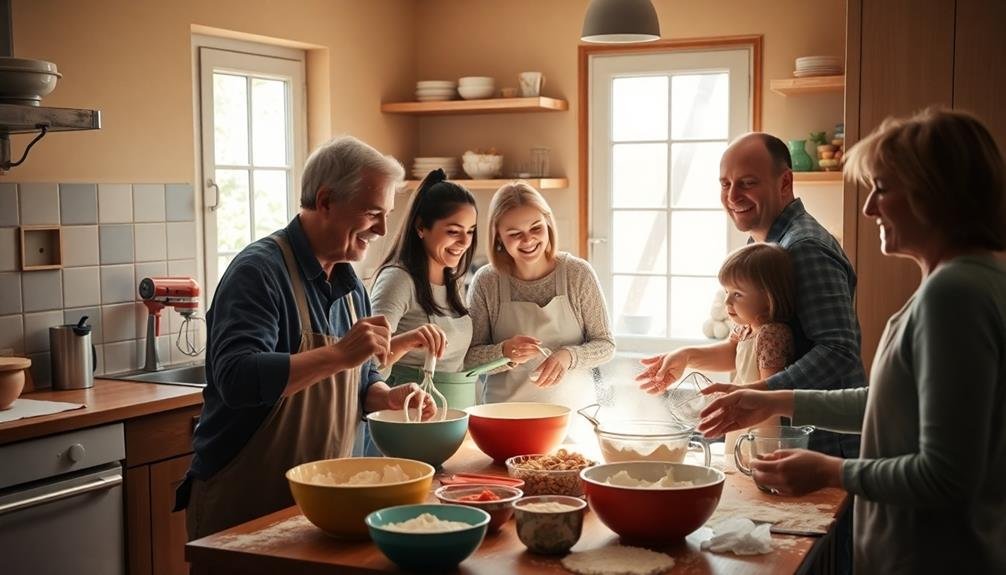
Mixing, kneading, and creating together, family baking offers a unique form of therapy. When you gather in the kitchen with your loved ones, you're not just making treats; you're fostering connection and reducing stress.
The act of baking engages multiple senses, from the tactile experience of working with dough to the comforting aroma of fresh-baked goods. This sensory involvement can help ground you in the present moment, temporarily distracting from worries and anxieties.
As you measure ingredients and follow recipes, you're practicing mindfulness and focus. This structured activity can provide a sense of control and accomplishment, especially valuable during uncertain times.
Baking together also encourages communication and teamwork, strengthening family bonds. You'll find that sharing tasks and collaborating on a common goal can improve relationships and boost mood.
The creativity involved in decorating cookies or designing cakes allows for self-expression and can be incredibly cathartic. Plus, the shared enjoyment of eating your homemade creations releases endorphins, promoting feelings of happiness and well-being.
Mindfulness Through Measuring Ingredients
Three key aspects make measuring ingredients a mindful practice. First, it demands your full attention, pulling you into the present moment. Second, it requires precision, encouraging focus and care. Third, it engages multiple senses, grounding you in the experience.
When you're measuring ingredients, you're fully engaged in the task at hand. You're not worrying about work deadlines or family disputes. Instead, you're concentrating on leveling that cup of flour or carefully pouring vanilla extract. This focused attention is a form of meditation, allowing your mind to rest from its usual whirlwind of thoughts.
The act of measuring also creates a rhythm, a soothing repetition that can calm your nerves. As you scoop, level, and pour, you're creating a mindful ritual. This process can be particularly beneficial for children, teaching them patience and attention to detail.
To truly embrace the mindfulness of measuring, try these steps:
- Take a deep breath before you start
- Feel the texture of each ingredient
- Listen to the sounds of pouring and sifting
- Observe the colors and shapes of the ingredients
Bonding Over Shared Goals
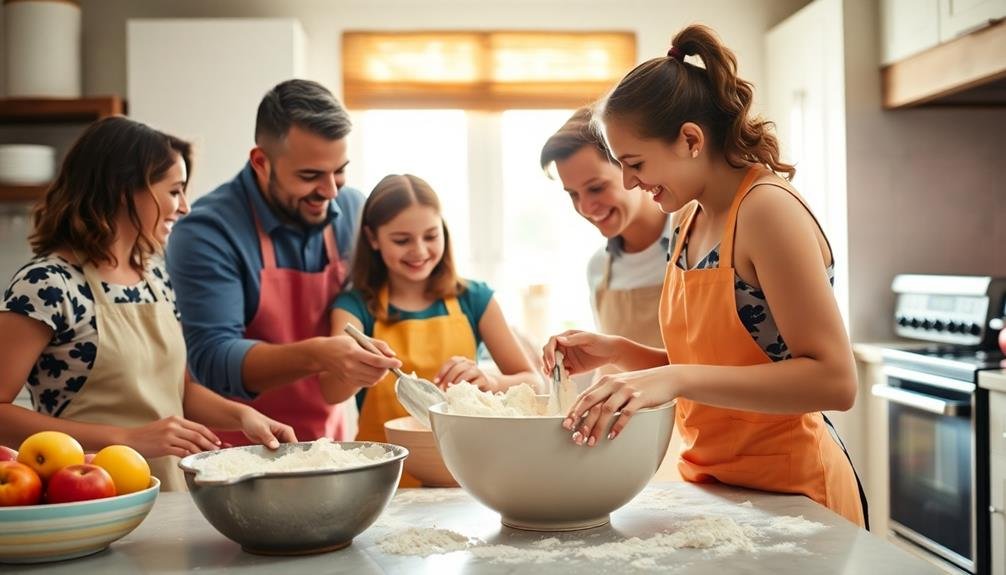
When you bake together as a family, you're creating a common purpose that unites everyone.
You'll find yourselves naturally developing teamwork skills as you divide tasks, share utensils, and work towards the final product.
Once your baked goods are ready, you can all celebrate your collective achievement, reinforcing the bonds formed during the process.
Creating Common Purpose
Baking as a family provides a shared goal that brings everyone together. When you initiate a baking project, you're all working towards the same delicious outcome. This common purpose helps reduce individual stress by shifting focus from personal concerns to a collective effort.
You'll find that as you mix, measure, and create together, tensions dissolve, and a sense of unity emerges. The process of baking offers numerous opportunities for collaboration and teamwork:
- Assigning roles: One person measures ingredients, another mixes, while someone else prepares the baking pans.
- Problem-solving: Collectively figuring out how to substitute an ingredient you've run out of or adjusting baking times for your oven.
- Sharing knowledge: More experienced bakers can teach techniques to newcomers, fostering intergenerational connections.
- Celebrating results: Everyone gets to enjoy the fruits of their labor, reinforcing the value of working together.
Fostering Teamwork Skills
The kitchen transforms into a classroom for teamwork when families bake together. You'll find that dividing tasks and working towards a common goal naturally fosters cooperation. As you assign roles, consider each family member's strengths and interests. Let your child measure ingredients while you preheat the oven, or have your partner mix the batter as you prepare the baking pan.
This collaborative process teaches valuable skills that extend beyond the kitchen. You'll learn to communicate effectively, giving clear instructions and listening to others' ideas. Time management becomes vital as you coordinate different steps of the recipe.
Problem-solving skills are honed when you encounter unexpected challenges, like running out of an ingredient or adjusting baking times. You'll also practice patience and compromise, essential elements of teamwork. Sometimes you'll need to wait for your turn to use a utensil or agree on flavor choices.
These experiences build empathy and understanding among family members. By working together to create something delicious, you're not just baking – you're building a stronger, more cohesive family unit that can tackle challenges both in and out of the kitchen.
Celebrating Collective Achievements
A freshly baked cake sitting on the counter represents more than just a delicious treat – it's a symbol of your family's collective achievement.
When you bake together, you're not just creating food; you're building memories and celebrating shared success. This collective accomplishment fosters a sense of pride and unity within your family.
As you gather around the finished product, take a moment to appreciate the teamwork that went into its creation.
You'll find that celebrating these small victories can greatly boost morale and strengthen family bonds. Here's what you might experience:
- A surge of collective pride as you admire your creation
- Shared excitement as you taste the results of your hard work
- Increased confidence in your family's ability to work together
- A stronger sense of connection through the shared experience
Stress Relief Through Kneading Dough
When you knead dough, you'll find it's an excellent way to release physical tension.
The mindful, repetitive motion of working the dough can help calm your mind and reduce stress.
You'll also enjoy the tactile sensory experience, which can be grounding and soothing during hectic family times.
Physical Tension Release
Kneading dough provides a unique opportunity for physical stress relief. As you work the dough with your hands, you'll feel the tension in your muscles begin to dissipate. The repetitive motion of pushing, folding, and stretching the dough acts as a form of exercise, releasing endorphins that boost your mood and reduce stress levels.
You'll notice several physical benefits as you knead:
- Your shoulders and upper back muscles relax as you lean into the dough.
- Your hands and forearms get a gentle workout, improving circulation.
- Your core engages as you apply pressure, strengthening abdominal muscles.
- Your breathing naturally deepens, promoting relaxation.
This physical activity not only helps you release pent-up tension but also improves your overall well-being. As you focus on the task at hand, you'll find your mind clearing of worries and anxieties.
The tactile experience of working with dough can be grounding, bringing you into the present moment and away from stressful thoughts. By the time you've finished kneading, you'll likely feel more relaxed and centered, ready to face any challenges that come your way.
Mindful Repetitive Motion
The rhythmic motion of kneading dough can serve as a form of mindfulness meditation. As you work the dough, you'll find yourself focusing on the present moment, allowing worries and stressors to fade into the background. This repetitive action engages your senses, from the texture of the dough beneath your fingers to the subtle changes in its consistency as you knead.
You'll notice your breathing naturally slowing and becoming more regular as you fall into a rhythm. This mindful state can help lower your heart rate and blood pressure, reducing overall stress levels. The act of kneading also releases tension in your hands, arms, and shoulders, providing a gentle upper body workout.
As you continue the process, you may find your mind clearing, making space for creative thoughts or problem-solving. This meditative state can be particularly beneficial for children, helping them learn to focus and manage emotions.
Tactile Sensory Experience
Beyond its meditative qualities, kneading dough offers a rich tactile sensory experience that can greatly reduce stress. As you work the dough with your hands, you'll engage multiple senses, grounding yourself in the present moment. The physical act of kneading releases tension in your muscles and provides a satisfying outlet for pent-up energy.
When you're baking with your family, encourage everyone to take turns kneading the dough. This hands-on activity creates a shared experience that can strengthen bonds and improve communication. You'll notice how the texture of the dough changes as you work it, becoming smoother and more elastic over time.
Here's what you might experience while kneading dough:
- The cool, slightly sticky feeling of flour on your fingers
- The warmth of the dough as it responds to your touch
- The rhythmic sound of the dough slapping against the counter
- The yeasty aroma that fills the air as you work
Creative Expression in Decorating
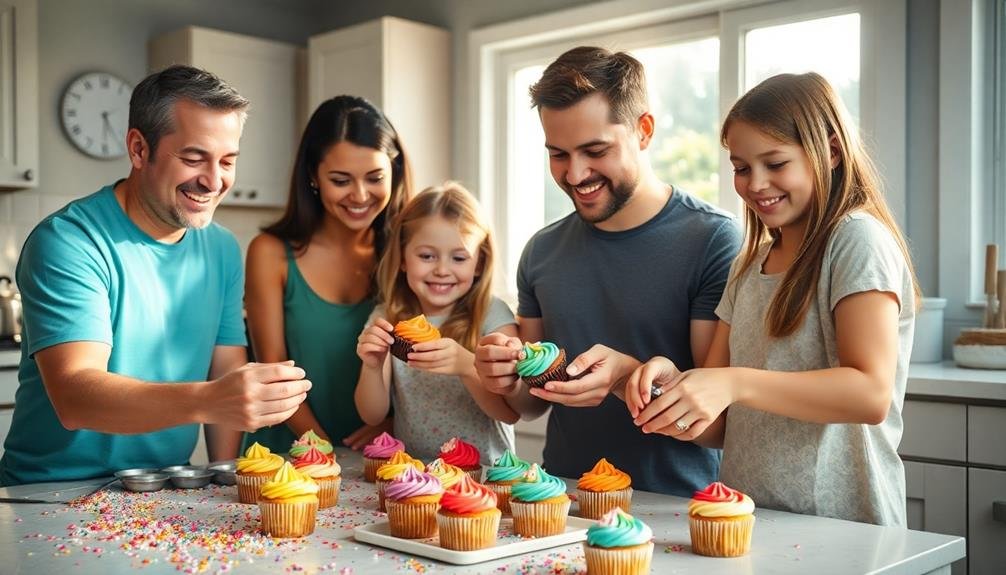
Decorating baked goods offers a canvas for family members to express their creativity. You'll find that frosting, sprinkles, and edible decorations allow everyone to personalize their creations. As you work together, you're free to experiment with colors, patterns, and designs, turning simple cookies or cakes into unique works of art.
You'll notice how each family member's personality shines through in their decorating choices. Your kids might opt for bold, vibrant colors and playful designs, while you or your partner might prefer more intricate, elegant patterns. This diversity in decoration styles can spark conversations and laughter, further strengthening family bonds.
The act of decorating also encourages problem-solving and decision-making skills. You'll need to choose complementary colors, balance different elements, and work within the confines of your baked goods' shapes. This process can be particularly beneficial for children, as it enhances their fine motor skills and spatial awareness.
Moreover, the pride you'll feel in your finished products can boost self-esteem and confidence. Displaying and sharing your decorated treats with others allows your family to showcase their collective creativity, fostering a sense of accomplishment and unity.
Sense of Accomplishment
When you bake with your family, you're working towards shared goals.
As you mix, measure, and create together, you're building something tangible that everyone can enjoy.
The moment you pull that perfectly baked treat from the oven, you'll all feel a sense of pride and accomplishment in what you've achieved as a team.
Shared Goals Achieved
What better way to build family unity than by achieving a shared goal? When you bake together as a family, you're not just making a delicious treat; you're working towards a common purpose.
This collaborative effort strengthens bonds and creates a sense of teamwork that extends beyond the kitchen. As you mix, measure, and bake, you're all contributing to a final product that you can enjoy together.
This shared accomplishment fosters a feeling of pride and satisfaction among family members. You'll experience the joy of seeing your combined efforts come to fruition, reinforcing the idea that you're stronger when you work as a team.
Here's what you can expect when achieving shared goals through baking:
- Increased communication and problem-solving skills
- A boost in confidence for both children and adults
- A tangible representation of your family's teamwork
- A sense of collective achievement that brings you closer
Tangible Results Celebrated
The fruits of your family's labor become tangible as you pull the freshly baked goods from the oven. The aroma fills the kitchen, and you can't help but feel a sense of pride in what you've created together.
As you gather around to admire your work, you're not just looking at cookies or a cake; you're seeing the result of your combined efforts and teamwork.
Celebrating these tangible results reinforces positive family dynamics. You'll find yourselves enthusiastically sharing the treats with neighbors or friends, proudly explaining how you made them as a family.
This shared accomplishment becomes a talking point, strengthening your bond and creating lasting memories.
Don't underestimate the power of these small victories. They boost confidence and encourage future collaborations.
You might find your family seeking out new recipes to try or planning regular baking sessions. The sense of achievement you feel when you master a challenging recipe or perfect a family favorite is invaluable.
It teaches patience, perseverance, and the joy of working towards a common goal. Plus, you get to enjoy the delicious rewards of your hard work together.
Aromatherapy From Baked Goods
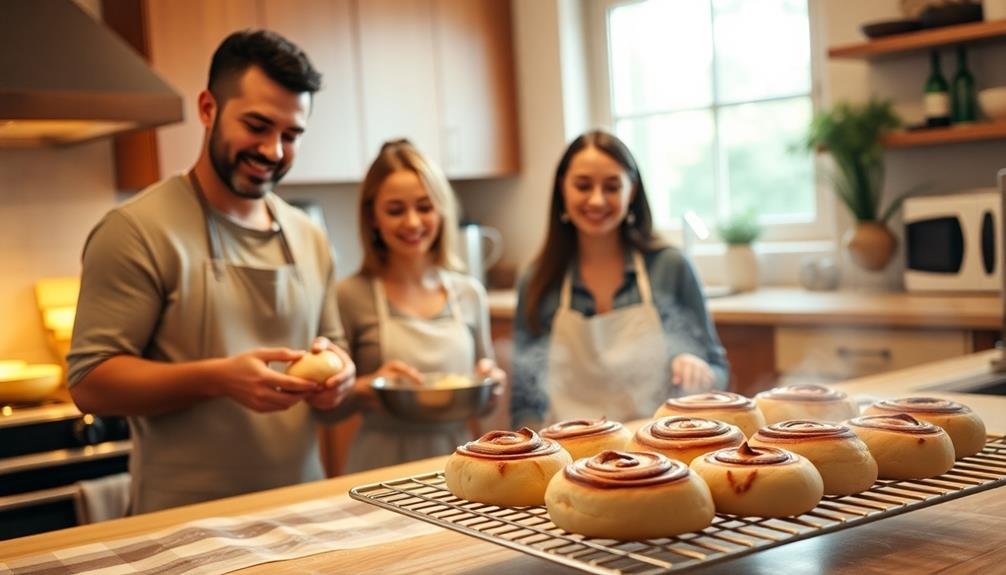
Many people underestimate the power of scent in reducing stress and improving mood. When you bake with your family, you're not just creating delicious treats; you're also filling your home with aromatic compounds that can have a significant impact on everyone's well-being.
The scents wafting from your oven can trigger positive emotions and memories, helping to create a warm, comforting atmosphere. As you bake together, you'll notice how these aromas can:
- Stimulate the release of serotonin, a neurotransmitter associated with happiness and relaxation
- Lower cortisol levels, reducing stress and anxiety
- Evoke fond memories of past baking experiences, fostering a sense of nostalgia and connection
- Increase feelings of contentment and satisfaction as you anticipate enjoying the finished product
Different baked goods offer unique aromatherapy benefits. The scent of vanilla can promote calmness and reduce anxiety, while cinnamon may improve focus and cognitive function.
Chocolate's aroma can boost mood and reduce stress, and the smell of freshly baked bread often induces feelings of comfort and security.
Nurturing Through Nourishment
Beyond the sensory delights of baking, preparing food together offers a unique opportunity to nurture your family's physical and emotional well-being. When you bake with your loved ones, you're not just creating tasty treats; you're fostering a sense of care and nourishment that goes beyond the ingredients.
Baking together allows you to control what goes into your food, ensuring healthier options for your family. You'll teach valuable life skills while bonding over shared tasks. This process nurtures both body and soul, creating lasting memories and traditions.
| Benefits of Baking Together | Physical | Emotional |
|---|---|---|
| Nutrition | Healthier ingredients | Sense of accomplishment |
| Skill Development | Cooking techniques | Patience and teamwork |
| Family Bonding | Shared activity | Strengthened relationships |
As you mix, knead, and shape dough together, you're also shaping your family's connection. You'll find that the act of creating something from scratch and sharing it with others is deeply satisfying. It's a tangible way to show love and care, fostering a nurturing environment that can help reduce stress and anxiety within your household.
Laughter and Fun in Kitchen
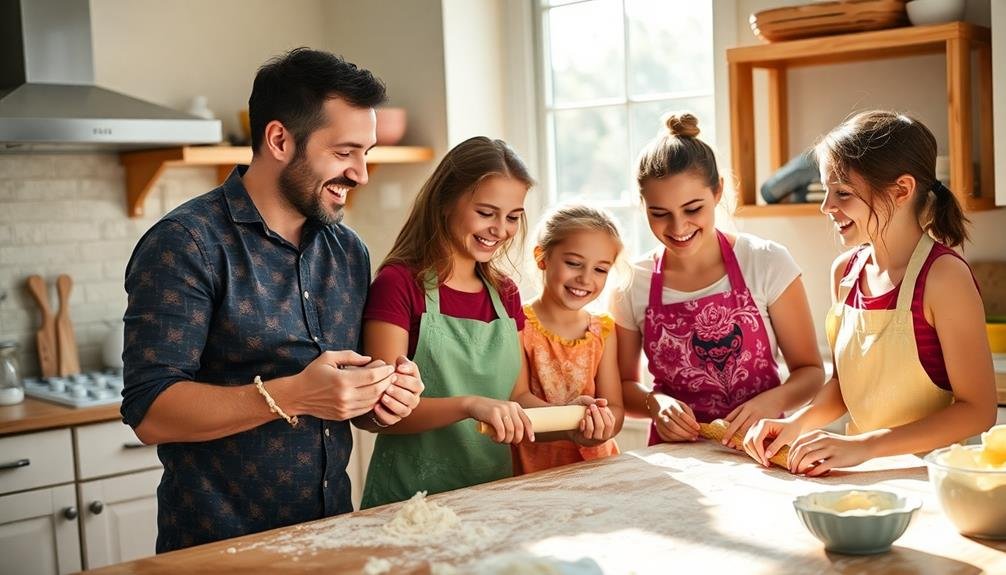
Filled with giggles and playful banter, the kitchen becomes a haven for family fun during baking sessions. You'll find that laughter and joy naturally emerge as you mix, measure, and create together. The shared experience of baking fosters a lighthearted atmosphere, allowing stress to melt away and positive emotions to take center stage.
As you engage in baking activities, you'll notice:
- Silly flour fights breaking out, leaving everyone covered in a fine white powder
- Competitive decorating contests that bring out everyone's creative side
- Taste-testing sessions that lead to exaggerated reactions and funny faces
- Impromptu dance parties while waiting for treats to come out of the oven
These moments of levity strengthen family bonds and create lasting memories. You'll find that the kitchen transforms into a place where inside jokes are born and shared experiences become treasured stories.
The act of baking together encourages open communication, allowing family members to connect on a deeper level while enjoying each other's company. By infusing fun and laughter into your baking routine, you're not just creating delicious treats, but also nurturing a positive family dynamic that can help alleviate stress and promote overall well-being.
Improved Communication During Baking
As families gather in the kitchen to bake together, communication naturally improves. You'll find that the shared task of baking creates a relaxed atmosphere where conversations flow more easily. While measuring ingredients or kneading dough, you're more likely to discuss your day, share concerns, or simply catch up with each other.
The collaborative nature of baking encourages teamwork and problem-solving. You'll need to coordinate tasks, delegate responsibilities, and work together to achieve the final product. This process naturally enhances your family's communication skills, teaching you to listen actively and express yourselves clearly.
Baking also provides opportunities for teachable moments. Parents can explain techniques or share family recipes, fostering intergenerational connections. Children feel more comfortable asking questions or sharing their thoughts in this informal setting.
Moreover, the act of creating something together builds a sense of shared accomplishment. You'll find yourselves discussing the process, giving feedback, and planning future baking projects. This ongoing dialogue strengthens your family bonds and improves overall communication patterns, extending beyond the kitchen into everyday life.
Developing Patience and Focus
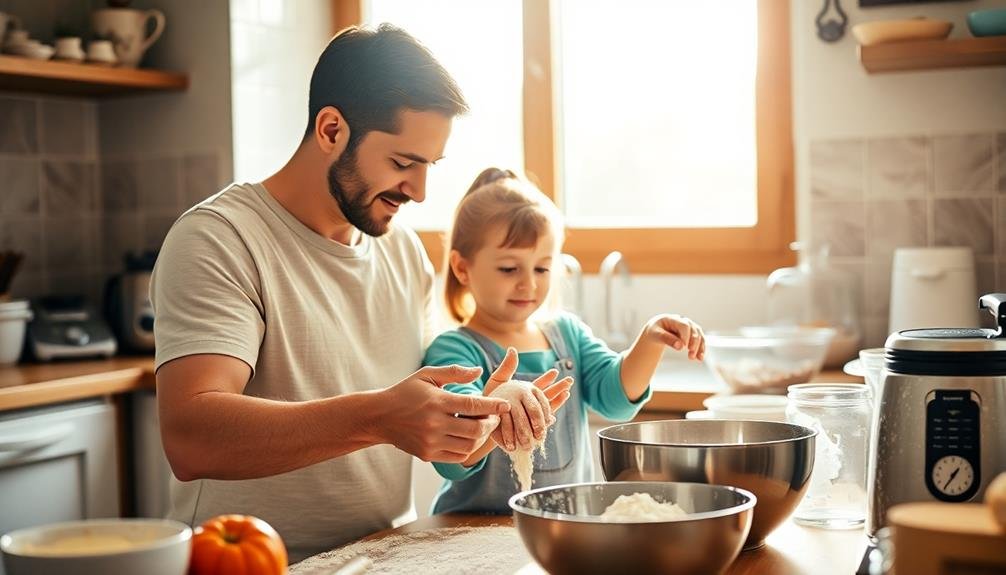
Baking often requires a level of patience and focus that many find challenging in today's fast-paced world. When you bake with your family, you'll naturally develop these essential skills together.
You'll learn to wait for dough to rise, for cookies to bake, or for a cake to cool before frosting. This process teaches you and your loved ones the value of delayed gratification and the importance of following instructions precisely.
As you work through recipes, you'll find yourselves becoming more attentive to details and more focused on the task at hand. This heightened concentration can spill over into other areas of your life, improving your overall ability to stay present and mindful.
Here's how baking together can boost patience and focus:
- Waiting for ingredients to reach room temperature
- Carefully measuring and mixing components
- Observing the baking process without opening the oven
- Allowing baked goods to cool before decorating
Boosting Self-Esteem With Culinary Skills
Beyond fostering patience and focus, family baking sessions can greatly boost self-esteem through the development of culinary skills. As you and your children master new recipes and techniques, you'll notice a surge in confidence. Watching a cake rise perfectly or pulling out a batch of golden-brown cookies can fill you with a sense of accomplishment.
You'll find that baking together allows each family member to contribute their unique talents. Your child might excel at measuring ingredients precisely, while you're great at decorating. This division of tasks helps everyone feel valued and important to the process.
As skills improve, you can tackle more challenging recipes, further enhancing self-esteem. The praise and appreciation from family and friends when they taste your creations will reinforce these positive feelings.
You'll also develop problem-solving skills as you learn to troubleshoot baking issues, fostering a can-do attitude. Over time, you'll build a repertoire of recipes you can confidently prepare, giving you a sense of expertise in the kitchen.
This newfound culinary prowess can spill over into other areas of life, boosting overall self-esteem and confidence.
Creating Lasting Family Memories
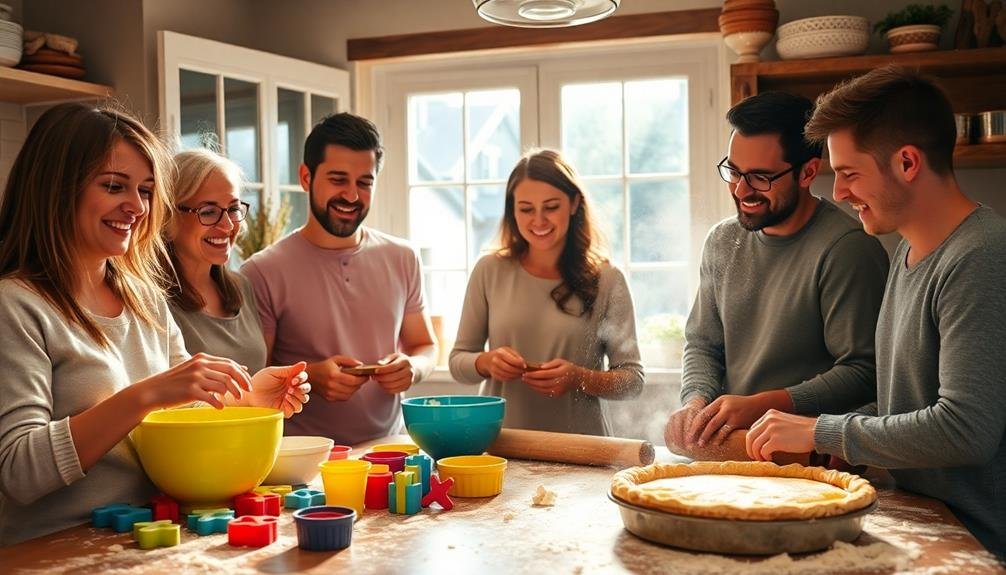
Through the simple act of baking together, families create lasting memories that will be cherished for years to come. You'll find that the kitchen becomes a hub of shared experiences, laughter, and bonding.
As you mix, measure, and bake with your loved ones, you're not just making delicious treats; you're crafting moments that will stay with you forever.
Picture the scene:
- Your children's faces light up as they crack eggs for the first time
- Flour-dusted noses and giggles as you knead dough together
- The irresistible aroma of freshly baked cookies filling your home
- Proud smiles as everyone admires the final product of your teamwork
These shared experiences become part of your family's unique story. You're passing down recipes, teaching valuable life skills, and fostering a sense of accomplishment.
In years to come, the smell of certain baked goods might transport you back to these precious moments. By making baking a regular family activity, you're building a treasure trove of memories that will comfort and connect you, even as your children grow older and perhaps start families of their own.
Frequently Asked Questions
How Can I Involve Reluctant Family Members in Baking Activities?
You can involve reluctant family members by starting small. Choose easy recipes, assign specific tasks, and make it fun. Use their favorite flavors, create a friendly competition, or tie baking to a special event they're excited about.
What Are Some Easy, Kid-Friendly Recipes for Family Baking Sessions?
You'll love these kid-friendly recipes: chocolate chip cookies, banana bread, and simple cupcakes. Try no-bake options like rice krispie treats or fruit tarts. Start with easy recipes and gradually increase complexity as your family's skills improve.
How Do I Manage Kitchen Safety With Young Children While Baking?
You'll want to supervise closely, teach safe practices, and assign age-appropriate tasks. Keep hot surfaces off-limits, use child-safe utensils, and practice proper hand washing. Always explain potential dangers and lead by example in kitchen safety.
Can Baking Together Help Improve Relationships Between Siblings?
Yes, baking together can improve sibling relationships. You'll see them cooperate, share tasks, and communicate better. It's a fun way to bond, create memories, and develop teamwork skills. They'll learn to appreciate each other's strengths and support one another.
What Baking Activities Are Suitable for Families With Dietary Restrictions?
You can try gluten-free cookies, vegan muffins, or sugar-free fruit tarts. Don't forget no-bake options like energy balls or fruit leathers. Experiment with alternative flours and sweeteners to accommodate various dietary needs while still enjoying family baking time.
In Summary
You've discovered a delicious recipe for family harmony. By baking together, you're not just creating treats – you're building bonds, easing stress, and making memories. It's a chance to unplug, focus on the moment, and connect with loved ones. Whether you're kneading dough or decorating cookies, you're nurturing skills and relationships. So next time family stress rises, head to the kitchen. You'll find that baking together is the sweetest way to bring everyone closer.


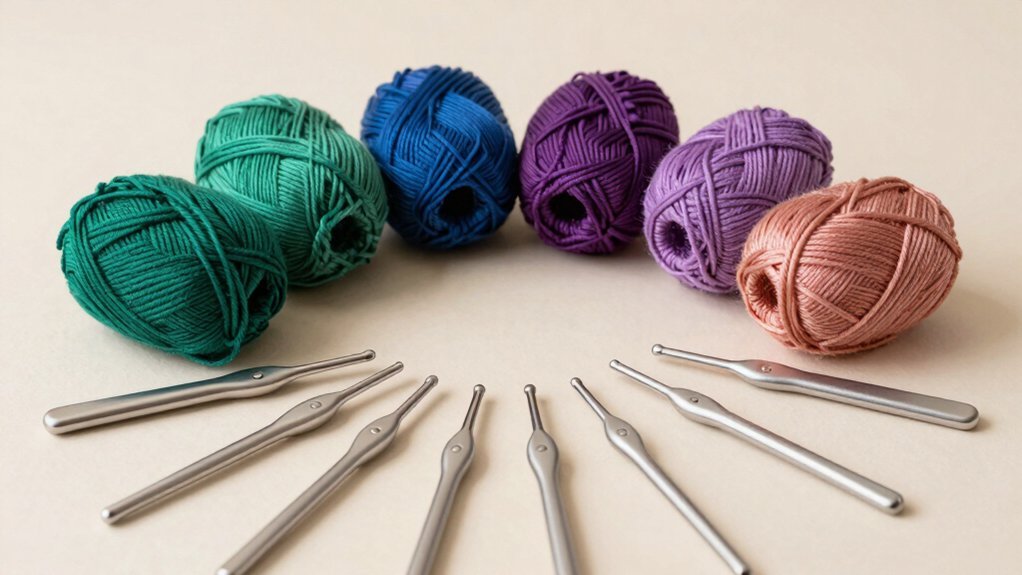


Leave a Reply